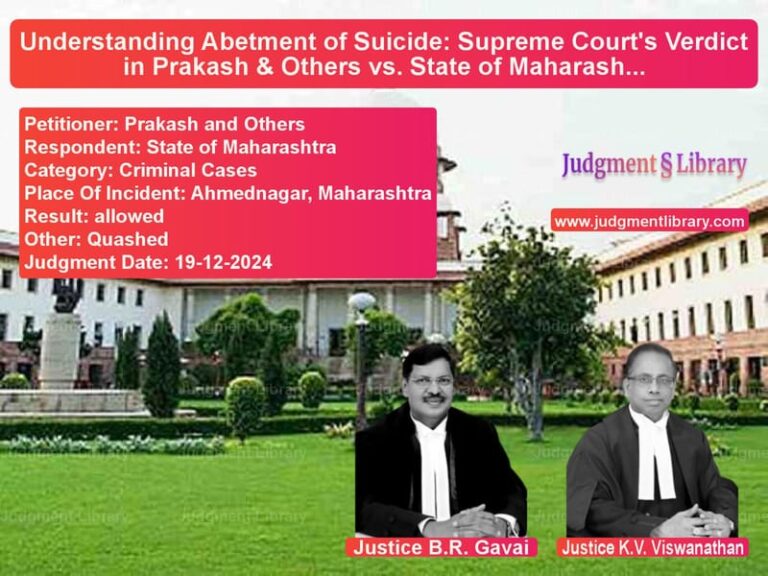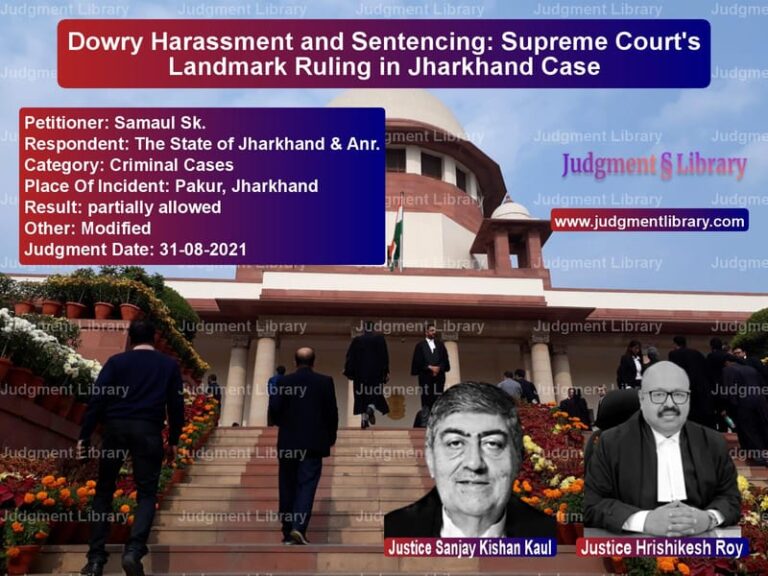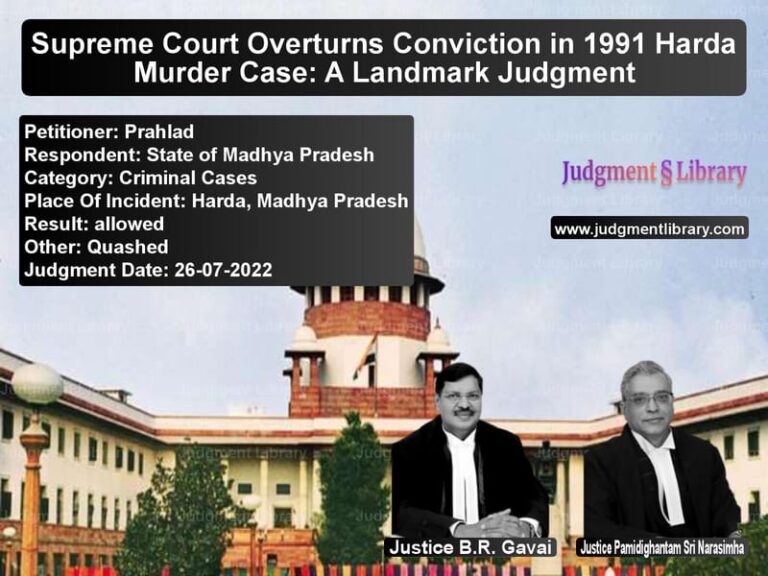Legal Enrollment Dispute: Supreme Court Upholds Bar Council’s Decision to Cancel Enrollment
The case of Anand Kumar Sharma v. Bar Council of India & Anr. revolves around the legal complexities of enrollment as an advocate and the power of the Bar Council to remove a person’s name from the roll of advocates. The Supreme Court of India, in its judgment dated March 1, 2019, upheld the Bar Council’s decision to cancel the enrollment of the appellant, Anand Kumar Sharma, and dismissed his repeated attempts to be re-enrolled as an advocate.
This case is significant for its exploration of the Bar Council’s authority under the Advocates Act, 1961, particularly in cases involving misrepresentation or suppression of facts during the enrollment process.
Case Background
The appellant, Anand Kumar Sharma, was initially enrolled as an advocate with the Bar Council of Himachal Pradesh in July 1988. However, a complaint was made to the Bar Council of Rajasthan, alleging that Sharma had obtained his enrollment by suppressing key facts related to his past.
Sharma’s past included a conviction under Section 419 of the Indian Penal Code (IPC) for cheating, as well as a period of absence from service in the Government of Himachal Pradesh. These details were not disclosed during his initial enrollment application.
In response to the complaint, the Bar Council of India canceled Sharma’s enrollment as an advocate on November 6, 1995. The cancellation was based on the suppression of material facts at the time of his enrollment. The appellant challenged this decision, but his Special Leave Petition was dismissed by the Supreme Court on August 5, 1996.
Subsequent to the cancellation of his enrollment, Sharma made several attempts to be re-enrolled as an advocate, claiming exemption from the required training due to his previous experience as a lawyer. These attempts were repeatedly rejected, culminating in the Bar Council of Rajasthan refusing to enroll him on July 14, 2012.
Petitioner’s Arguments
The appellant, represented by Advocate Anurag Dubey, raised several arguments in his defense:
- The Bar Council of Rajasthan had incorrectly refused his application for enrollment, despite his previous experience in legal practice.
- He was wrongfully denied exemption from the mandatory one-year training requirement, which he believed was unfair considering his background as a doctor and his earlier work as an advocate.
- The Bar Council of India’s earlier decision to cancel his enrollment was based on misrepresentation and suppression of facts, but his subsequent acquittal and the passing of time should allow for reconsideration of his case.
Respondent’s Arguments
The Bar Council of India, represented by Advocate Tanmaya Agarwal, and the Bar Council of Rajasthan, countered the appellant’s claims by arguing:
- The appellant’s earlier conviction and the suppression of facts during the enrollment process were sufficient grounds for the cancellation of his enrollment under the Advocates Act, 1961.
- Sharma’s repeated attempts to be re-enrolled, despite the clear order from the Supreme Court and the Bar Council, amounted to an abuse of legal process.
- Under Section 26 of the Advocates Act, the Bar Council of India has the power to remove the name of an advocate from the roll of advocates if enrollment was obtained through misrepresentation.
- His repeated attempts to seek re-enrollment, despite the previous rulings, were an attempt to revive a case that had already been settled.
Supreme Court’s Observations and Ruling
The Supreme Court reviewed the facts of the case, considering the appellant’s earlier conviction and the subsequent attempts to be re-enrolled. The Court observed:
“The suppression that was alleged against the Appellant at the time of seeking enrollment in the Bar Council of Himachal Pradesh pertains to his being in Government service in the State of Himachal Pradesh and his involvement in a criminal case. Subsequent acquittal cannot come to the rescue of the Appellant.”
The Court further noted the Bar Council’s authority under the Advocates Act:
“Section 26 of the Advocates Act, 1961 confers power on the Bar Council of India to remove the name of a person who entered on the Roll of Advocates by misrepresentation.”
In light of the appellant’s misrepresentation during his initial enrollment, the Court concluded that the Bar Council of India had acted within its legal powers to cancel his enrollment. It also rejected the appellant’s repeated applications for re-enrollment, emphasizing that:
“The repeated attempts made by the Appellant later amount to an abuse of process. The Appellant would be better advised not to indulge in pursuing the matter pertaining to his enrollment as Advocate.”
The Court concluded:
“The orders impugned in the Appeals do not suffer from any infirmity and are upheld. The Appeals are dismissed accordingly.”
Conclusion
The Supreme Court’s ruling in this case serves as an important reminder of the Bar Council’s authority to regulate the enrollment of advocates and the importance of transparency and truthfulness during the application process. The key points from the judgment include:
- Suppression of material facts during enrollment is a serious issue that can lead to the cancellation of an advocate’s enrollment.
- The Bar Council of India has the authority to remove the name of an advocate from the roll of advocates if enrollment was obtained through misrepresentation.
- Repeated attempts to re-enroll after such a cancellation are an abuse of the legal process.
- Subsequent acquittal or changes in the appellant’s legal status do not necessarily undo the effects of past misrepresentation.
This case underscores the need for integrity and transparency in the legal profession, as well as the importance of following the procedures laid down by the Bar Council to ensure the credibility of legal practitioners.
Petitioner Name: Anand Kumar Sharma.Respondent Name: Bar Council of India & Anr..Judgment By: Justice L. Nageswara Rao, Justice M.R. Shah.Place Of Incident: Himachal Pradesh, Rajasthan.Judgment Date: 01-03-2019.
Don’t miss out on the full details! Download the complete judgment in PDF format below and gain valuable insights instantly!
Download Judgment: Anand Kumar Sharma vs Bar Council of India Supreme Court of India Judgment Dated 01-03-2019.pdf
Direct Downlaod Judgment: Direct downlaod this Judgment
See all petitions in Legal Malpractice
See all petitions in Employment Disputes
See all petitions in Public Sector Employees
See all petitions in Judgment by L. Nageswara Rao
See all petitions in Judgment by Mukeshkumar Rasikbhai Shah
See all petitions in dismissed
See all petitions in supreme court of India judgments March 2019
See all petitions in 2019 judgments
See all posts in Constitutional Cases Category
See all allowed petitions in Constitutional Cases Category
See all Dismissed petitions in Constitutional Cases Category
See all partially allowed petitions in Constitutional Cases Category







